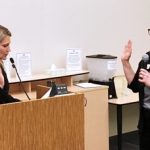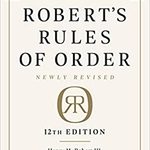Meeting Minutes
This article describes the benefits of action minutes. It was first published on the MRSC blog. MRSC is a private nonprofit organization, formerly known as “Municipal Resources and Service Center,” serving local governments in Washington State. The insights described here apply to local governments across the nation. If your council, commission, or committee takes detailed…
Read MoreDear Dinosaur: In our organization, one person makes the agenda for the meeting, chairs the meeting, takes the notes, and creates the minutes. Besides being a lot of work for one person, it seems like more people should be involved to avoid the appearance of a concentration of power within the commission. Are there specific…
Read MoreOur faithful readers know that Jurassic Parliament advocates for action or summary minutes, not detailed minutes. This article, Meeting minutes record what is DONE, not what is SAID, explains our reasoning. We thought it might be helpful to provide a real-life example of each kind of minutes, so here they are. Robert’s Rules of Order…
Read MoreDear Dinosaur: When a member of our city council says, “I want this on the record!” do we have to include their remarks in the minutes? Answer: Not necessarily. Robert’s Rules says that the purpose of minutes is to record the actions taken by the body. In general, minutes should not include individual remarks. If…
Read MoreThe biggest problem we encounter in meeting minutes is too much verbiage. Striving to do justice to their job, secretaries sometimes include the arguments that are made, what people say in response, and all the minutiae of discussion. There is a better way! According to Robert’s Rules of Order, minutes should record what is DONE,…
Read MoreThe clerk of a local government meeting or the secretary on a nonprofit board has a high calling. Under Robert’s Rules, two persons must be present for a valid meeting: the chair and the secretary. They cannot be the same person, and state law often specifies this as well. The clerk or secretary keeps the…
Read MoreThere are 3 lists that every secretary of a nonprofit board should maintain in the organization’s official record book: A running list of the dates of board meetings. A list of officers elected or appointed and their terms, including dates when they resign or are removed from office if such occurs. A list of…
Read MoreHave you ever attended an annual meeting of an organization and been asked to vote to approve the minutes from the previous year’s annual meeting? How well did you remember that previous meeting? I am guessing that your memory was a bit fuzzy, unless something dramatic happened. There is a better way. Use Minutes…
Read MoreHere are the sample minutes provided in Robert’s Rules of Order Newly Revised, 12th edition, in section 48:8. The regular monthly meeting of the L.M. Society was held on Thursday, January 4, 20__, at 8:30 P.M., at the Society’s building, the President being in the chair and the Secretary being present. The minutes of the…
Read MoreThere are half a dozen things that DO NOT BELONG in your minutes. Here they are. 1. Things that didn’t happen don’t belong in the minutes This may sound unlikely, but we have seen instances where after the meeting, the chair or a board member wants to put something in the minutes that didn’t actually…
Read More










